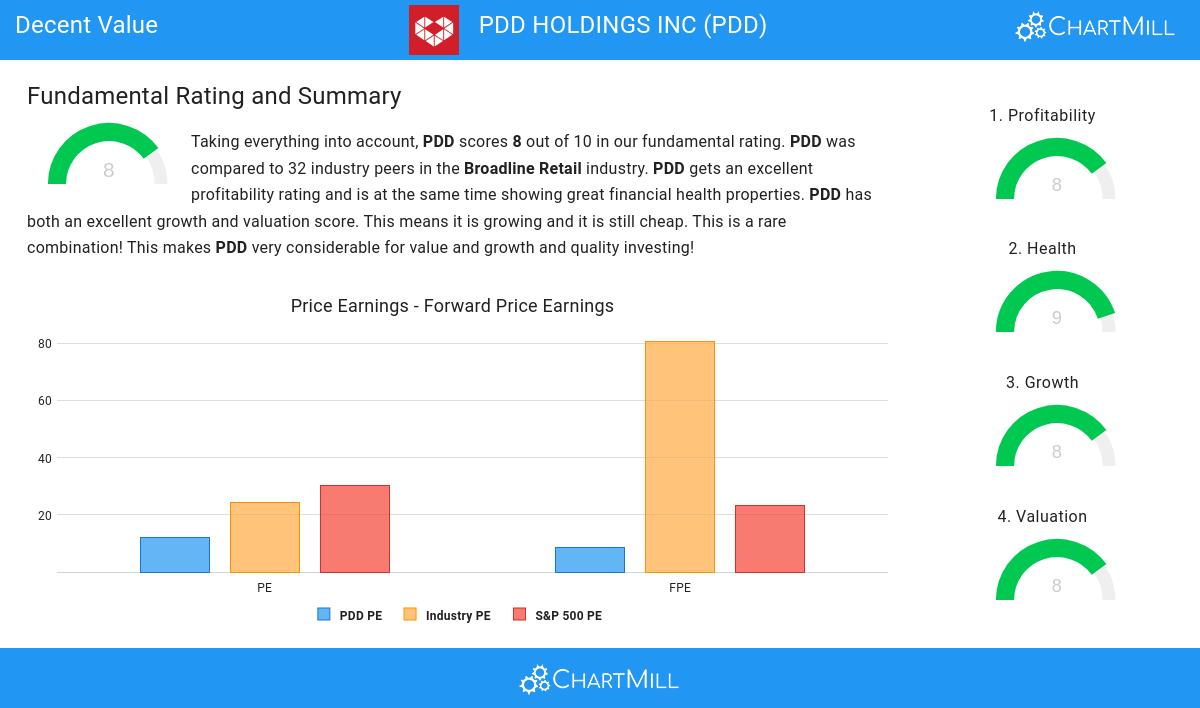NASDAQ:PDD, an undervalued stock with good fundamentals.
By Mill Chart
Last update: Nov 5, 2024
Our stock screening tool has pinpointed PDD HOLDINGS INC (NASDAQ:PDD) as an undervalued stock. NASDAQ:PDD maintains a solid financial footing. Furthermore, it remains attractively priced. Let's delve into the specifics below.

Valuation Assessment of NASDAQ:PDD
ChartMill employs its own Valuation Rating system for all stocks. This score, ranging from 0 to 10, is determined by evaluating different valuation factors, including price to earnings and free cash flow, both in absolute terms and relative to the market and industry. NASDAQ:PDD has earned a 8 for valuation:
- PDD is valuated reasonably with a Price/Earnings ratio of 11.91.
- Compared to the rest of the industry, the Price/Earnings ratio of PDD indicates a somewhat cheap valuation: PDD is cheaper than 62.50% of the companies listed in the same industry.
- PDD's Price/Earnings ratio indicates a rather cheap valuation when compared to the S&P500 average which is at 30.20.
- The Price/Forward Earnings ratio is 8.49, which indicates a very decent valuation of PDD.
- Based on the Price/Forward Earnings ratio, PDD is valued cheaper than 81.25% of the companies in the same industry.
- PDD's Price/Forward Earnings ratio indicates a rather cheap valuation when compared to the S&P500 average which is at 23.28.
- Based on the Enterprise Value to EBITDA ratio, PDD is valued a bit cheaper than 71.88% of the companies in the same industry.
- Based on the Price/Free Cash Flow ratio, PDD is valued a bit cheaper than the industry average as 78.13% of the companies are valued more expensively.
- The low PEG Ratio(NY), which compensates the Price/Earnings for growth, indicates a rather cheap valuation of the company.
- PDD has an outstanding profitability rating, which may justify a higher PE ratio.
- PDD's earnings are expected to grow with 38.57% in the coming years. This may justify a more expensive valuation.
What does the Profitability looks like for NASDAQ:PDD
ChartMill assigns a proprietary Profitability Rating to each stock. The score is computed by evaluating various profitability ratios and margins and ranges from 0 to 10. NASDAQ:PDD was assigned a score of 8 for profitability:
- PDD has a better Return On Assets (22.84%) than 100.00% of its industry peers.
- The Return On Equity of PDD (38.91%) is better than 100.00% of its industry peers.
- PDD has a better Return On Invested Capital (31.76%) than 100.00% of its industry peers.
- Measured over the past 3 years, the Average Return On Invested Capital for PDD is significantly above the industry average of 11.65%.
- The 3 year average ROIC (17.97%) for PDD is below the current ROIC(31.76%), indicating increased profibility in the last year.
- The Profit Margin of PDD (28.93%) is better than 100.00% of its industry peers.
- PDD has a Operating Margin of 28.57%. This is amongst the best in the industry. PDD outperforms 100.00% of its industry peers.
- PDD has a Gross Margin of 62.44%. This is amongst the best in the industry. PDD outperforms 84.38% of its industry peers.
Deciphering NASDAQ:PDD's Health Rating
Every stock is evaluated by ChartMill, receiving a Health Rating on a scale of 0 to 10. This assessment considers different health aspects, including liquidity and solvency, both in absolute terms and relative to industry peers. NASDAQ:PDD has achieved a 9 out of 10:
- PDD has an Altman-Z score of 6.54. This indicates that PDD is financially healthy and has little risk of bankruptcy at the moment.
- With an excellent Altman-Z score value of 6.54, PDD belongs to the best of the industry, outperforming 84.38% of the companies in the same industry.
- PDD has a debt to FCF ratio of 0.04. This is a very positive value and a sign of high solvency as it would only need 0.04 years to pay back of all of its debts.
- With an excellent Debt to FCF ratio value of 0.04, PDD belongs to the best of the industry, outperforming 93.75% of the companies in the same industry.
- PDD has a Debt/Equity ratio of 0.02. This is a healthy value indicating a solid balance between debt and equity.
- PDD has a better Debt to Equity ratio (0.02) than 78.13% of its industry peers.
- PDD has a Current Ratio of 2.11. This indicates that PDD is financially healthy and has no problem in meeting its short term obligations.
- PDD's Current ratio of 2.11 is fine compared to the rest of the industry. PDD outperforms 68.75% of its industry peers.
- PDD has a Quick Ratio of 2.11. This indicates that PDD is financially healthy and has no problem in meeting its short term obligations.
- The Quick ratio of PDD (2.11) is better than 81.25% of its industry peers.
ChartMill's Evaluation of Growth
A key component of ChartMill's stock assessment is the Growth Rating, which spans from 0 to 10. This rating evaluates diverse growth factors, such as EPS and revenue growth, considering both past performance and future projections. NASDAQ:PDD has received a 8 out of 10:
- The Earnings Per Share has grown by an impressive 112.20% over the past year.
- The Revenue has grown by 106.72% in the past year. This is a very strong growth!
- PDD shows a strong growth in Revenue. Measured over the last years, the Revenue has been growing by 79.96% yearly.
- Based on estimates for the next years, PDD will show a very strong growth in Earnings Per Share. The EPS will grow by 30.86% on average per year.
- The Revenue is expected to grow by 26.32% on average over the next years. This is a very strong growth
Our Decent Value screener lists more Decent Value stocks and is updated daily.
Check the latest full fundamental report of PDD for a complete fundamental analysis.
Keep in mind
Important Note: The content of this article is not intended as trading advice. It is essential to perform your own analysis and exercise caution when making trading decisions. The article presents observations created by automated analysis but does not guarantee any trading or investment outcomes. Always trade responsibly and make independent judgments.
NASDAQ:PDD (12/17/2025, 11:39:09 AM)
105.15
-3.87 (-3.55%)
Find more stocks in the Stock Screener
PDD Latest News and Analysis



